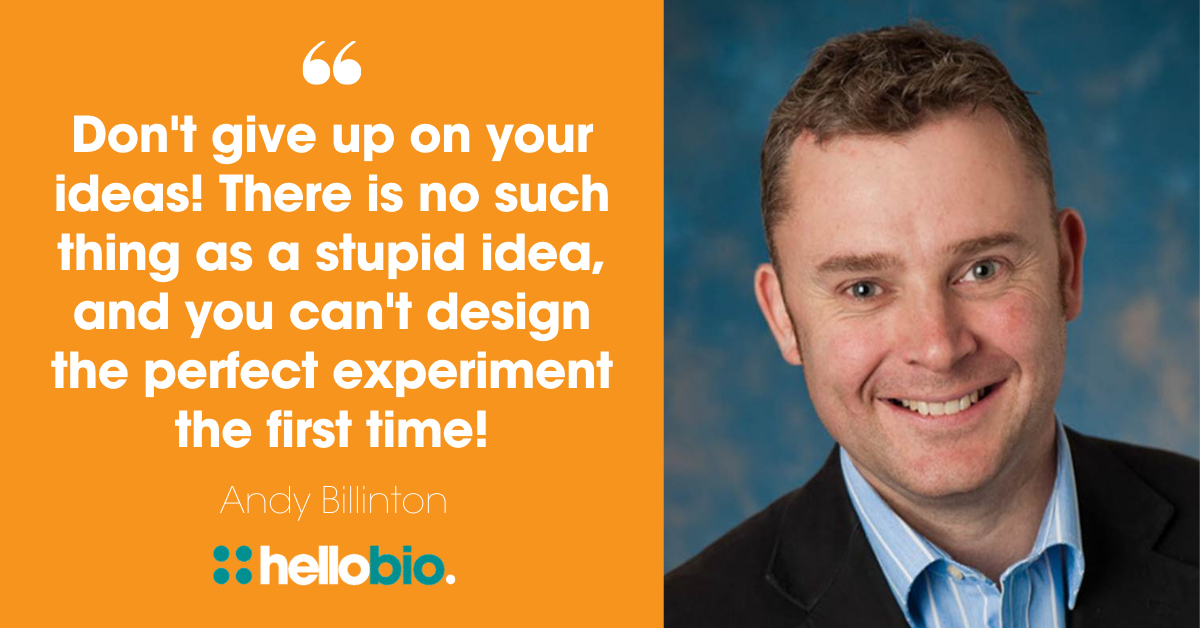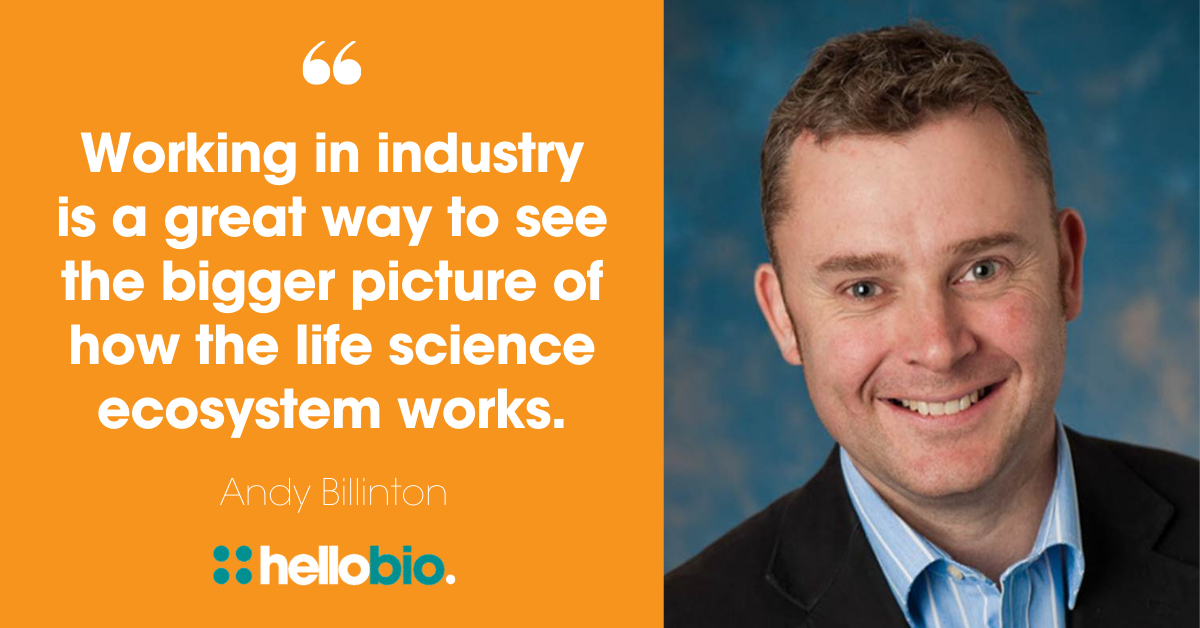Interviews with Scientists: Andy Billinton
Andy Billinton is a Senior Director in Therapeutics & Translational Neuroscience at NodThera Ltd. He has previously worked for AstraZeneca and GlaxoSmithKline. He completed a BSc in Pharmacology at the University of Bristol before gaining a PhD in Neuroscience at the University of Birmingham. He later completed a postdoc role at The Babraham Institute before taking on permanent positions within the pharma industry.
We spoke to Andy about his current role at NodThera Ltd and what a typical work day looks like for him. He also shares some useful advice for those wanting to move into industry from academia, and he explains how an enthusiastic family member inspired him to pursue a career in therapeutics.
Thanks for speaking with us, Andy! Firstly, please tell us a bit more about your current role...
In 2019, after 20 years in big pharma Neuroscience drug discovery and development at GSK and MedImmune/AstraZeneca, I decided to join a small VC funded biotech for a different view on the life science ecosystem. I integrate data across chemistry, biology, drug metabolism and pharmacokinetics to try to 'hunt' out the best drug candidates for NLRP3 - a key player in innate immunity as part of a complex that drives production of the cytokine IL-1beta that seems to go awry in many disease situations.
Did you always want to work in science when you were younger, and if so, why?
My uncle spent 32 years at ICI/Zeneca/AstraZeneca - he was so enthusiastic about discovering and developing therapeutics to help people. That definitely got me interested.
What is it about your field of work that excites you most?
I like data and using it to make decisions about projects, based on problem solving.
What does a typical day at work look like for you?
Coffee first. Ideas. Then discussing datasets related to lead compounds with colleagues over Zoom or Teams - what do we do next with each compound? Calls with CROs or academic collaborators to discuss experiments/data/troubleshooting. Data crunching. Reading papers. More ideas (hopefully). More coffee.
What is the most important lesson you have learned in your career so far?
Don't give up on your ideas! There is no such thing as a stupid idea, and you can't design the perfect experiment the first time!
What do you think are the biggest challenges facing life scientists today?
Keeping your science on track. So much published literature is irreproducible, for many reasons. It's very easy to be taken down the wrong track and spend time and money on the wrong studies. But you learn from all experiments, and knowing when to change direction is a key skill. Also, academics spend far too much time chasing ever decreasing pots of money. It’s not the best use of their time really.
How has the COVID-19 pandemic affected your work?
It’s affected it only from the point of view of being at home for 17 months! As a company we have actually been more productive, but I think we all miss some face-to-face time.
Are there any aspects of the pandemic that have been unexpectedly positive for your career?
Working from home full-time has made balancing my home and work life easier. Working from home effectively is a key skill in itself.
What advice would you give to a young scientist at the start of their academic career?
Keep an open mind - that’s the key to everything I think.
What advice might you offer a life scientist looking to move from academia to industry?
If you want to focus more on applied science, then go for it. Working in industry is a great way to see the bigger picture of how the life science ecosystem works. Brilliant academic ideas can be turned into medicines, although it does take a while and many projects fail for all sorts of reasons. But often it’s because we don't understand human disease sufficiently.
Who has been your greatest role model, and why?
I've been lucky to have great bosses all the way through my career so far, but I learned a huge amount from my CASE PhD supervisor Neil Upton who was also my first Department Head at GSK.
If you weren't working in science, what do you think you would be doing instead?
I’d be a guitarist in a failed rock band!
What do you think is the greatest scientific discovery of all time?
Probably the structure of DNA. We take this for granted now.
What's your favourite science quote?
'If you cannot explain it simply, you do not understand it well enough' - Einstein. This is important as science loses value if the population as a whole cannot understand what your data means without excess jargon. The pandemic has highlighted this even more!
_________________________________________________
Thank you so much for a fantastic interview, Andy! We wish you all the best with your future career.
Connect with Andy Billinton:
- LinkedIn: Andy Billinton
- ResearchGate: Andy Billinton
_________________________________________________
If you enjoyed this article, why not check out the other resources available on our blog. We are passionate about supporting life scientists including early career life scientists and PhD students - with really low-priced reagents and biochemicals, early career scientist grants, and resources to help with both personal and professional development. We know how tough it is - so we hope you find these helpful!
More General Support for Life Scientists
For advice on writing papers, dissertations, presenting at conferences, wellbeing, PhD support, networking and lots more, we have a huge range of articles to help - just click below:
Save up to 50% on our high purity reagents...
When you get to the stage of planning your experiments, don't forget that we offer a range of low-cost, high-purity agonists, antagonists, inhibitors, activators, antibodies and fluorescent tools (yes - they really are around half the price of other suppliers!) You can use our Quick Multi-Search Tool to search for lots of products in one go, and the range includes:
- Enzyme inhibitors and activators
- Chemogenetic ligands
- Ion channel modulators
- GPCR & ionotropic receptor ligands
- Cell biology reagents & biochemicals
Technical resources
Try our Molarity Calculator: a quick and easy way to calculate the mass, volume or concentration required for making a solution.
Try our Dilution Calculator: an easy way to work out how to dilute stock solutions of known concentrations
And finally, don't forget to check back in with our blog regularly for our latest content! If there’s something you’d love to contribute to the community, whether that’s an interview or article, drop us a line at hello@hellobio.com


















